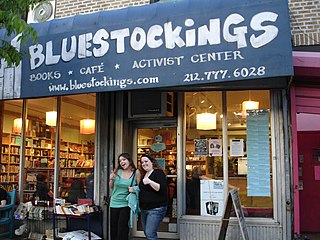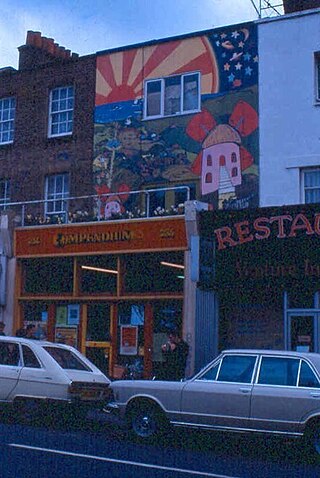
An independent bookstore is a retail bookstore which is independently owned. Usually, independent stores consist of only a single actual store. They may be structured as sole proprietorships, closely held corporations or partnerships, cooperatives, or nonprofits. Independent stores can be contrasted with chain bookstores, which have many locations and are owned by corporations which often have divisions in other lines besides bookselling. Specialty stores such as comic book shops tend to be independent.

Bluestockings is a radical bookstore, café, and activist center located in the Lower East Side of Manhattan, New York City. It started as a volunteer-supported and collectively owned bookstore; and is currently a worker-owned bookstore with mutual aid offerings/free store. The store started in 1999 as a feminist bookstore and was named for a group of Enlightenment intellectual women, the Bluestockings. Its founding location was 172 Allen Street, and is currently located a few blocks east on 116 Suffolk Street.

Self-managed social centres in the United Kingdom can be found in squatted, rented, mortgaged and fully owned buildings. These self-managed social centres differ from community centres in that they are self-organised under anti-authoritarian principles and volunteer-run, without any assistance from the state. The largest number have occurred in London from the 1980s onwards, although projects exist in most cities across the UK, linked in a network. Squatted social centres tend to be quickly evicted and therefore some projects deliberately choose a short-term existence, such as A-Spire in Leeds or the Okasional Café in Manchester. Longer term social centres include the 1 in 12 Club in Bradford, the Cowley Club in Brighton and the Sumac Centre in Nottingham, which are co-operatively owned.

Bold Street is a street in Liverpool, England. It is known for its concentration of independent businesses and for the Church of St Luke, which is situated at the top end of the street. The bottom end leads into the area surrounding Clayton Square, which is part of the main retail district of central Liverpool. The bottom end contains more shops which are chain stores. Liverpool Central, a major hub of the Merseyrail rapid transit/commuter rail network, can also be accessed via an entrance on Bold Street next to The Lyceum, a post office which was Europe's first lending library. The middle area contains bars as it leads towards Concert Square, a square containing clubs and bars, and the top end contains more independent shops and cafes. For the most part, Bold Street is pedestrianised and cars do not have access.

Gay's the Word is an independent bookshop in central London, and the oldest LGBT bookshop in the United Kingdom. Inspired by the emergence and growth of lesbian and gay bookstores in the United States, a small group of people from Gay Icebreakers, a gay socialist group, founded the store in 1979. These included Peter Dorey, Ernest Hole and Jonathan Cutbill. Various locations were looked at, including Covent Garden, which was then being regenerated, before they decided to open the store in Marchmont Street in Bloomsbury, an area of the capital with rich academic and literary associations. Initial reluctance from Camden Council to grant a lease was overcome with help from Ken Livingstone, then a local councillor, later Mayor of London. For a period of time, it was the only LGBT bookshop in England.
Firestorm Books is a worker-owned and self-managed "anti-capitalist business" in Asheville, North Carolina. Named after the firestorm, this infoshop operates with an eye on creating a sustainable, radical community event space. Firestorm features regular events, such as film screenings, political and economic teach-ins, local and traveling musicians and community workshops.

Compendium Books was an independent bookstore in London specialising in experimental literary and theoretical publications, from 1968 until its closure in 2000. The Guardian's John Williams described it as "Britain's pre-eminent radical bookstore. Whether you wanted books on anarchism, drugs, poststructuralism, feminism or Buddhism, Compendium was the place to go."
The Silver Moon Bookshop was a feminist bookstore on Charing Cross Road in London founded in 1984 by Jane Cholmeley, Sue Butterworth, and Jane Anger. They established Silver Moon Bookshop to share intersectional feminist rhetoric with a larger community of readers and encourage open discussion of women’s issues. The shop served both as a safe space for women to participate in literary events and a resource center to learn about local feminist initiatives. The owners of Silver Moon Bookshop eventually expanded into the publishing field through establishing Silver Moon Books, as well as creating the store newsletter Silver Moon Quarterly.

The Lucy Parsons Center, located in Jamaica Plain, Boston, Massachusetts, is a radical, nonprofit independent bookstore and self-managed social center. Formed out of the Red Word bookstore, it is collectively run by volunteers. The center provides reading material, space for individuals to drop in, and a free space for meetings and events.

Feminist bookstores sell material relating to women's issues, gender, and sexuality. These stores served as some of the earliest open spaces for feminist community building and organizing.
Feminist businesses are companies established by activists involved in the feminist movement. Examples include feminist bookstores, feminist credit unions, feminist presses, feminist mail-order catalogs, and feminist restaurants. These businesses flourished as part of the second and third-waves of feminism in the 1970s, 1980s, and 1990s. Feminist entrepreneurs established organizations such as the Feminist Economic Alliance to advance their cause. Feminist entrepreneurs sought three primary goals: to disseminate their ideology through their businesses, to create public spaces for women and feminists, and to create jobs for women so that they did not have to depend on men financially. While they still exist today, the number of some feminist businesses, particularly women's bookstores, has declined precipitously since 2000.
The Lavender Menace Bookshop was an independent gay bookshop in Edinburgh from 1982 to 1986. It was the first gay bookshop in Scotland and the second in the United Kingdom.

Category Is Books is an independent bookshop in Glasgow, Scotland. It is one of only two LGBT+ bookshop in Scotland and one of only eight in the United Kingdom. It was established by Bug and Fionn Duffy-Scott in September 2018.

Housmans is a bookshop in London, England, and is one of the longest-running radical bookshops in the United Kingdom. The shop was founded by a collective of pacifists in 1945 and has been based in Kings Cross, since 1959. Various grassroots organisations have operated from its address, including the Gay Liberation Front, the Campaign for Nuclear Disarmament, and London Greenpeace. Housmans shares its building with its sister organisation Peace News.
Sigrid Catherine Nielsen is best known as the co-founder and co-owner of Scotland's first gay bookshop, Lavender Menace Bookshop.
Sisterwrite was Britain's first feminist bookshop. The bookshop, which opened in 1978, was run as a collective. Sisterwrite was located at 190 Upper Street, in the Islington district of north London. Mary Coghill and Kay Stirling invited Lynn Alderson to join them in opening a women's bookshop. The three of them became the founders of Sisterwrite. Money was tight at the beginning, however, Mary was able to give $5,000 towards its opening and her sister gave $3,000. They began fundraising and sent a letter around to different organizations and women to sign, showing their support. Once they reached $11,000, they began to work on opening the shop. The opening was a difficult process as all three women lived in squats and relied on welfare benefits while they paid off debts and worked until Sisterwrite became economically viable. The squatting community became a feminist, urban phenomenon as women were able to discuss the Women's Liberation movement in a safe space.Sisterwrite was commended for its knowledgeable workers led by Coghill, Stirling, and Alderson, and their willingness to discuss women's literature with patrons. The bookshop also contained a cafe, called Sisterbite.

Rose City Book Pub is a bookstore and bar in Portland, Oregon. Owner Elise Schumock started the business in 2018. It was described as the only business of its kind in the city in 2022.
Publications Distribution Cooperative (PDC) was set up in 1976 to distribute radical, socialist, feminist, green/ecology and community publications in Britain to the book and newsagent trade.
Radical bookshops in the United Kingdom promote radical literature on topics including animal rights, environmentalism, postcolonialism, self-help, and sexual politics.










